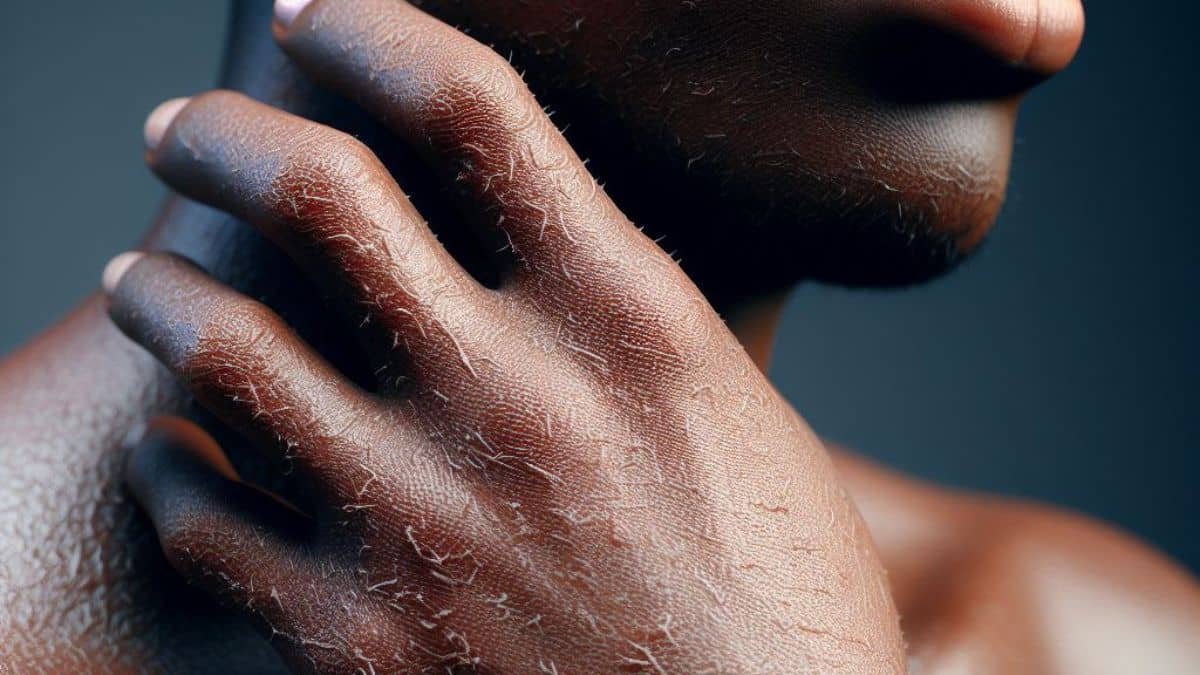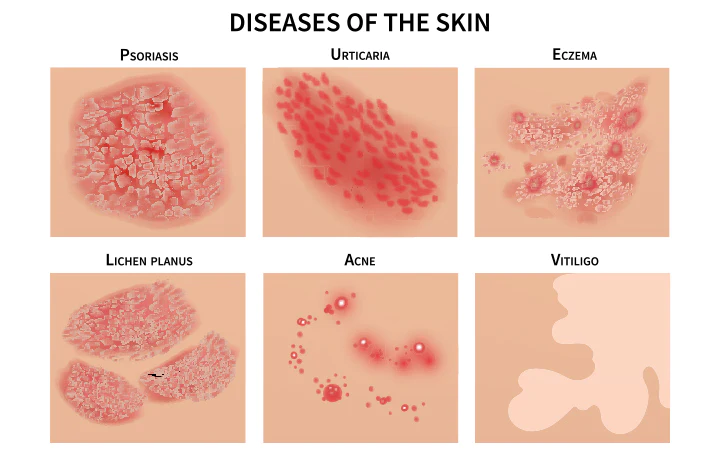What Vitamin Deficiency Causes Itchy Skin? Understanding the Link Between Vitamin Deficiencies and Skin Health

If you’re experiencing itchy skin, it could be a sign of a vitamin deficiency.
Vitamins play a crucial role in maintaining healthy skin, and a deficiency in certain vitamins can lead to a variety of skin problems, including dryness, flakiness, and itchiness.
Common causes of itchy skin include dryness, allergies, and skin conditions like eczema and psoriasis.
However, vitamin deficiencies can also be a cause of itchy skin. While there are several vitamins that are important for skin health, deficiencies in vitamins A, B12, D, and E are most commonly associated with itchy skin.
In this article, we’ll explore the types of vitamin deficiencies that can cause itchy skin, their symptoms, and how to prevent and treat them.
☝️ Keep in mind that numbers in brackets are links to scientific papers, research or trusted sources around the web that justify what I write in this post. If you find a discrepancy, send an email to hello@foodnourish.net.
Here’s a table summarizing the vitamin’s that cause itchy skin when deficient:
| Vitamin | Reason for Itching Due to Deficiency | Symptoms |
|---|---|---|
| B12 | Nerve damage from deficiency may lead to neuropathic itch. | Itchy skin, along with other symptoms of B12 deficiency. |
| A | Essential for maintaining healthy skin; deficiency can cause dry and itchy skin. | Dry and itchy skin. |
| C | Essential for collagen production; stabilizes collagen mRNA; deficiency affects skin health. | Skin rash, fatigue, muscle weakness, joint pain, fever. |
| E | Antioxidant protecting skin from damage; deficiency can lead to itchy skin conditions. | Itchy skin, potential improvement with vitamin E supplementation. |
| B7 (Biotin) | Essential for skin health; deficiency can cause itchy skin and a red, scaly rash. | Itchy skin, hair loss (alopecia), red, scaly rash around eyes, nose, and mouth. |
| D2 | Essential for healthy skin; deficiency can lead to dry, irritated skin. | Excessive sweating, dry and irritated skin. |
| B3 (Niacin) | Essential for skin tissue growth and repair; deficiency (pellagra) can cause skin issues. | Thick, scaly, and dark rash on sun-exposed skin, digestive and nerve issues. |
| Omega-3 and Omega-6 | Essential for maintaining skin’s moisture barrier; deficiency can cause dry, itchy skin. | Dry and itchy skin. |
| Iron | Essential for collagen metabolism; deficiency can lead to itchy skin. | Itchy skin, along with other symptoms of iron deficiency. |
| Zinc | Essential for skin tissue growth and repair; deficiency can lead to itchy skin. | Itchy skin, skin problems like acrodermatitis. |
What Vitamin Deficiency Causes Itchy Skin?

If you are experiencing itchy skin and you excluded all the above reasons of having it, then most probably the reason could be a vitamin deficiency.
Let’s have a look at some of the vitamin deficiencies that can cause itchy skin.
Vitamin B12
Vitamin B12 deficiency can cause itchy skin, among other symptoms. Vitamin B12 is responsible for the production of red blood cells and DNA. [4]
It also helps in maintaining healthy nerve function. [5]
A deficiency in vitamin B12 can cause nerve damage, leading to itchy skin (Neuropathic itch). [6]
Vitamin A
Vitamin A deficiency may also cause itchy skin. Vitamin A plays a crucial role in maintaining healthy skin. It helps in the growth and repair of skin tissues. [7]
A deficiency in vitamin A can cause dry and itchy skin. [8]
Vitamin C
Vitamin C is an essential vitamin that plays a vital role in maintaining healthy skin.
It is responsible for the production of collagen, which is essential for healthy skin.
Research has demonstrated that vitamin C has the ability to stabilize collagen mRNA, leading to an increase in the synthesis of collagen proteins. This, in turn, supports the repair of damaged skin. [9]
Also, changes in the skin can serve as the initial visible indicators of collagen vascular diseases, potentially aiding in early disease detection. [10]
The symptoms can vary depending on the particular condition and may encompass:
- Skin rash
- Fatigue
- Muscle weakness and discomfort
- Joint pain
- Fever
Vitamin E
Vitamin E is an antioxidant that helps in protecting the skin from damage caused by free radicals.
Vitamin E also helps in maintaining healthy skin in so many ways. [11]
For example, there’s a study that looked at using vitamin E to treat itchy skin condition called atopic dermatitis (AD). They gave vitamin E to some people and fake pills (placebo) to others. The people taking vitamin E felt better, with less itchiness and skin problems. This suggests that vitamin E could be a helpful treatment for AD, and it’s safe to use. [12]
Vitamin B7 (biotin)
Vitamin B7, also known as biotin, is essential for maintaining healthy skin, hair, and nails. A deficiency in biotin can cause itchy skin, among other symptoms.
A study found that when you don’t get enough biotin, your skin can have problems. This can make you lose hair (alopecia) and get a red, scaly rash around your eyes, nose, and mouth, which they call “biotin-deficient face.”
This rash looks like the one you might get if you don’t have enough zinc (which will be talking later on). It’s because biotin helps your body process fats, and when it’s missing, your skin can have issues. [13]
Vitamin D2
Vitamin D2 is essential for maintaining healthy bones and teeth.
It also plays a vital role in maintaining healthy skin.
Not getting enough vitamin D can make you sweat a lot, which is one of the first signs that something’s not right. This sweating happens all over, even on your face, and it can make your skin dry and irritated.
Also, according to this research paper, vitamin D has a special connection to our skin. Our skin can make vitamin D, but it’s also clear that vitamin D plays a big role in keeping our skin healthy and preventing skin diseases.
However, just living in sunny places doesn’t always mean you’ll have enough vitamin D, as studies have shown.
Vitamin B3
Vitamin B3, also known as niacin, is essential for maintaining healthy skin. It helps in the growth and repair of skin tissues. [14]
According to WebMD, not getting enough niacin, which is a severe condition called pellagra, can mess with your skin, tummy, and nerves. It might give you a thick, scaly, and dark rash on the skin that’s been out in the sun. [15]
Essential fatty acids
Essential fatty acids, such as omega-3 and omega-6, are essential for maintaining healthy skin. They help in maintaining the skin’s moisture barrier, which prevents dry and itchy skin. [16]
Iron
Iron is essential for the production of red blood cells. It also helps in maintaining healthy skin. A deficiency in iron can cause itchy skin, among other symptoms.
Research has shown that some proteins with iron in them are super important for collagen metabolism. Collagen is a protein that we have a lot of in our bodies. It’s like the scaffolding that holds our bones, muscles, tendons, and skin together.
Collagen also helps keep our skin looking young and healthy. So, these iron-containing proteins play a big role in keeping our body structures and skin in good shape. [17]
Zinc
Zinc is essential for maintaining healthy skin. It helps in the growth and repair of skin tissues. A deficiency in zinc can cause itchy skin, among other symptoms.
A study found that our skin, which has a lot of zinc, is made up of different layers, like the epidermis and dermis.
The research talks about how zinc and zinc transporters are crucial for the skin’s health.
When there are issues with these, it can lead to skin problems like acrodermatitis and other nutritional deficiencies. This skin trouble can be due to the loss of certain cells called LCs in the skin. [18]
Common Causes of Itchy Skin
Itchy skin can be caused by a variety of factors, including dry skin, eczema, allergies, hives, pregnancy, nerve disorders, anemia, and more.
Here are some common causes of itchy skin:
Dry Skin
Dry skin, also known as xerosis, is a common cause of itchy skin.
When your skin lacks moisture, it can become rough, scaly, and itchy. This can be exacerbated by cold, dry weather, low humidity, and hot showers or baths.
To relieve dry skin, use a moisturizer regularly and avoid hot water when showering or bathing.
Eczema
Eczema, also known as atopic dermatitis, is a chronic skin condition that can cause itchy, red, and inflamed skin. It often appears on the face, hands, feet, and inside of the elbows and knees.
Eczema can be triggered by stress, irritants, allergens, and changes in temperature. [1]
Treatment for eczema may include topical creams, oral medications, and lifestyle changes.
Allergies
Allergies can cause itchy skin, hives, and other skin reactions. Common allergens include pollen, dust mites, pet dander, and certain foods. [1]
If you suspect that you have an allergy, talk to your doctor about allergy testing and treatment options. If you don’t want to visit your doctor for this, you can buy an allergy testing kit for home use and perform the test yourself.
Hives
Hives, also known as urticaria, are raised, itchy bumps that can appear anywhere on the body. They are often caused by an allergic reaction to food, medication, or other substances. [2]
Hives can also be triggered by stress, heat, and exercise. [3]
Treatment for hives may include antihistamines and other medications.
Pregnancy
Pregnancy can cause itchy skin due to hormonal changes and stretching of the skin. Itchy skin during pregnancy is most common on the abdomen, breasts, and thighs.
To relieve itching during pregnancy, avoid hot showers or baths, wear loose-fitting clothing, and use a moisturizer.
Nerve Disorders
Nerve disorders, such as shingles and neuropathy, can cause itchy skin. Shingles is a viral infection that can cause a painful rash and itching.
Neuropathy is a condition that affects the nerves and can cause itching, burning, and tingling sensations.
Treatment for nerve disorders may include medication and other therapies.
Anemia
Anemia, a condition in which the body does not have enough red blood cells, can cause itchy skin.
This is because anemia can cause a decrease in oxygen supply to the skin, leading to dryness and itching. Treatment for anemia may include iron supplements and other therapies.
It is important to note that itchy skin can also be caused by other factors, such as eczema, psoriasis, dermatitis, rashes, acne, seborrheic dermatitis, inflammation, redness, and infection.
Symptoms of Vitamin Deficiency

If you are experiencing itchy skin, it could be a sign of a vitamin deficiency.
Vitamin D deficiency can cause dry, itchy skin, especially during the winter months when sunlight exposure is less. Vitamin B12 deficiency can also cause itchy skin, as well as a tingling sensation.
Other symptoms of vitamin deficiency include:
- Rash: Vitamin B6 deficiency can cause a red, itchy rash called seborrheic dermatitis. The rash can appear on your scalp, face, neck, and upper chest.
- Dry skin: Vitamin A deficiency can cause dry, rough skin.
- Brittle hair: Vitamin B7 (biotin) deficiency can cause brittle hair and nails.
- Nausea and loss of appetite: Vitamin B1 (thiamine) deficiency can cause nausea, loss of appetite, and fatigue.
- Easy bruising and bleeding: Vitamin K deficiency can cause easy bruising and bleeding.
- Night blindness and xerophthalmia: Vitamin A deficiency can also cause night blindness and xerophthalmia, a condition where the eyes cannot produce tears.
- Depression: Vitamin D deficiency has been linked to depression.
- Seizures: Low levels of vitamin B6 can increase the risk of seizures.
- Restless leg syndrome: Low levels of iron, folate, and magnesium have been linked to restless leg syndrome.
- Mouth ulcers: Low levels of vitamin B3 (niacin) can cause mouth ulcers.
- Muscle pain: Low levels of vitamin D and magnesium can cause muscle pain.
- Sleep: Low levels of magnesium can cause difficulty sleeping.
☝️ It is important to note that these symptoms can be caused by a variety of factors, not just vitamin deficiencies. Speak with your doctor to determine the underlying cause.
Prevention and Treatment of Vitamin Deficiencies
Maintaining a balanced and healthy diet is the best way to prevent vitamin deficiencies that can cause itchy skin.
- Nutrient Rich Foods: Consuming foods that are rich in vitamins A and B12 can help you avoid deficiency. Foods like eggs, dairy products, fish, and meat are good sources of vitamin B12, while vitamin A can be found in foods like sweet potatoes, carrots, and spinach.
- Supplements For Pregnant: If you are pregnant or planning to become pregnant, it is essential to take prenatal vitamins that contain folic acid, iron, and other essential vitamins to prevent vitamin deficiencies that can cause itchy skin and other complications.
- Supplements: Supplements can be taken to help treat vitamin deficiencies, but it is important to consult a doctor before taking any of them – especially if you have any other health conditions. Taking too much of certain vitamins can be toxic and cause harmful side effects. For reference, you can check our article on 8 Best Supplements for Skin Health.
- Proper Skin Care: In addition to a healthy diet and supplements, proper skin care can also help prevent itchy skin caused by vitamin deficiencies. Keeping your skin moisturized and avoiding harsh chemicals can help maintain healthy skin.
Best Dietary Sources of Essential Vitamins

Maintaining a healthy and balanced diet is crucial for getting all the essential vitamins and minerals that your body needs. If you are experiencing itchy skin, it could be a sign of a vitamin deficiency.
Here is a table with the best dietary sources of essential vitamins that can help keep your skin healthy and prevent itchiness.
| Vitamin/Mineral | Best Dietary Sources |
|---|---|
| Vitamin B12 | Animal liver, kidneys, clams, sardines, beef, tuna, fortified cereal, fortified nutritional yeast [19] [20] |
| Vitamin A | Liver, fish, eggs, dairy products, fortified cereals, sweet potatoes, carrots, spinach, kale, apricots, pumpkin, squash [21] |
| Vitamin C | Citrus fruits, tomatoes, potatoes, sweet potatoes, peppers, strawberries, pineapple, kiwi, oranges, lemons, limes, grapefruit, tomato juice, orange juice [21] |
| Vitamin E | Nuts, seeds, vegetable oils, wheat germ, fortified cereals, sunflower seeds, almonds, peanuts, avocados, spinach, broccoli, mango, kiwi [21] |
| Vitamin B7 (Biotin) | Whole grains, yeast, eggs, milk, cheese, peanuts, soy products, mushrooms, bananas, avocados, tomatoes, cucumbers, lettuce, spinach, kale, raspberries, strawberries, cocoa powder, chocolate, and coffee [22] |
| Vitamin D2 | Sunlight exposure, fortified dairy products, fortified cereals, fatty fish, egg yolks, and vitamin D supplements [23] |
| Vitamin B3 | Meat, poultry, fish, eggs, dairy products, nuts, and whole grains [21] |
| Essential Fatty Acids | Salmon, mackerel, tuna, sardines, walnuts, flaxseeds, chia seeds, and algae [24] |
| Iron | Red meat, poultry, fish, beans, peas, lentils, fortified cereals, and iron supplements [21] |
| Zinc | Oysters, crab, lobster, beef, pork, nuts, and fortified cereals [21] |
Frequently Asked Questions
Final Words
Understanding the link between vitamin deficiencies and skin health is essential for maintaining your skin’s well-being.
If you suspect a vitamin deficiency, it’s crucial to consult a medical professional for proper diagnosis and treatment. By incorporating a balanced diet rich in essential vitamins and minerals, you can help prevent and treat vitamin deficiencies that may cause itchy skin or other skin issues.
Remember, your skin is a reflection of your overall health, so taking care of your diet and addressing any underlying nutritional deficiencies can go a long way in promoting healthy and glowing skin.
Check These Article Related To Skin Health
